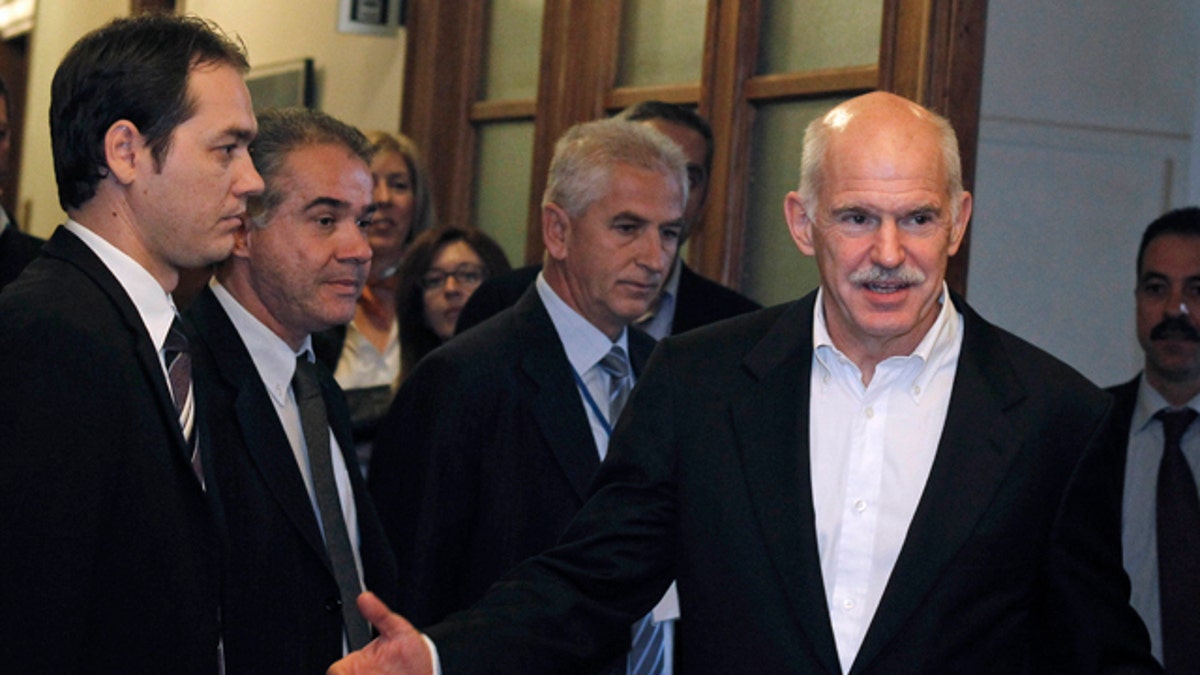
Nov. 8, 2011: Greek Prime Minister George Papandreou, right, gestures as he arrives for a cabinet meeting at the parliament in Athens. (AP)
ATHENS, Greece-- Pressure mounted on Greece's two main political parties on Wednesday to wrap up three days of critical power-sharing talks and name a new prime minister to take over at the helm of an interim government.
Over the past couple of days, attention has focused more on Rome than on Athens amid increasing concerns that Italy's economy was heading the same way as Greece's. The fear that Italy is running out of time to get a handle on its debts hit markets in Europe hard Wednesday even though Italy's Premier Silvio Berlusconi pledged to stand down, echoing a similar decision from Greek Prime Minister George Papandreou.
Greek officials defended the time it was taking for the new unity government to be established. Greece's big two political parties, the Socialist PASOK party and the conservative New Democracy, are renowned for their opposition to each other and have rarely worked together since the rejection of the monarchy in 1974.
Papandreou was due to hold with Greece's president at 5:00 p.m., a possible indication that a conclusion may have been reached.
Papandreou's office said the premier spoke by telephone with French President Nicolas Sarkozy Wednesday morning and discussed "the developments in Europe and the eurozone," as well as the power-sharing negotiations in Athens.
Sarkozy's office said Papandreou informed the French president "of the imminent (formation) of a new government in Greece supported by the majority and the opposition."
Former European Central Bank vice president Lucas Papademos had been tipped to become the interim prime minister, but it was unclear whether he remained the favored candidate by Wednesday.
By early afternoon, the conservative opposition was issuing angry statements demanding a swift conclusion to the talks, and blaming the embarassing delay on the current government.
"The solution is in the hands of Mr. Papandreou," said a statement from the New Democracy party. "No further delay is conceivable. We must finally finish this."
Earlier, deputy government spokesman Angelos Tolkas had said the new government would be announced later in the day, but gave no indication who the new prime minister would be. Similar comments had been made on Tuesday, too.
"This process is new to the country," Tolkas told television channel Skai in the morning. "So I think three days was a reasonable time for the consultations to be made and for each side to make the necessary concession."
On Tuesday, Papandreou's ministers offered their resignations as part of the process of creating the new government, which is only expected to last until February when early elections are to be held.
The new government will be tasked to secure the country's new euro130 billion ($179 billion) European rescue package and then get it through parliament. That approval will allow the release of a euro8 billion ($11 billion) loan installment from its existing bailout. Without the funds, Greece will go bankrupt before Christmas, potentially wrecking Europe's banking system and sending the global economy back into recession.
The political crisis erupted last week, when Papandreou said he would put the new European rescue package to a referendum. Other eurozone nations were horrified by the delay, markets around the world tanked and Greece's international creditors froze the payment of the next bailout installment.
On Monday, eurozone finance ministers said the heads of the two main parties had to commit in writing to the terms of the country's bailouts before Athens can receive the next loan installment.
Government officials in Greece say the written agreement requires the signatures of Papandreou, New Democracy leader Antonis Samaras, the Bank of Greece governor, the new coalition prime minister and the new finance minister -- a demand that has prompted an angry response from Greece's conservatives.
Greece has survived since May 2010 on a euro110 billion ($150 billion) bailout package from its eurozone partners and the International Monetary Fund. The second rescue package involves private bondholders voluntarily agreeing to cancel 50 percent of their Greek debt.
In return for the rescue funds, Greece has endured 20 months of punishing austerity measures.
The efforts by Papandreou's government to keep the country solvent have prompted violent protests, crippling strikes and a sharp decline in living standards for most Greeks.








































